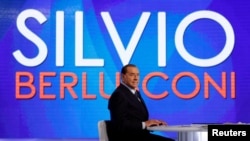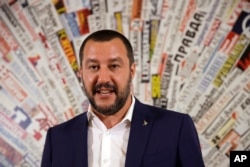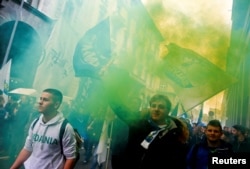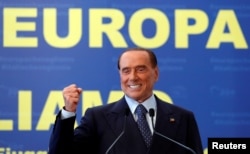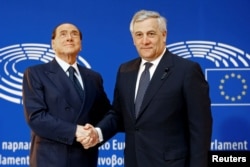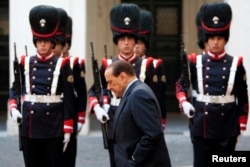His political obituary has been written many times over but Silvio Berlusconi is set once again to become the grand ringmaster of Italian politics.
But he will have to contend with Matteo Salvini, whose anti-migrant, euro-skeptic Lega party is in a rightwing electoral alliance with Berlusconi’s party, Forza Italia. Salvini is vying for the top job as prime minister and he’s unlikely, say insiders, to follow instructions meekly from the 81-year-old Berlusconi.
The alliance, which includes Fratelli d'Italia (Brothers of Italy), is likely to emerge as the largest political force in parliamentary elections Sunday and it may secure sufficient seats to form a majority government — or at least be close enough to be able to woo defectors from the ranks of rival parties with promises of government posts, say analysts.
Anti-migrant vote
On the election hustings, Salvini has been turning up the heat courting the anti-migrant vote with demands for the mass expulsion of the 600,000 asylum-seekers who have arrived in Italy in the past two years. He says they should be “cleared out street by street, neighborhood by neighborhood.”
And the Lega’s bellicose talk is seemingly helping it make inroads in the south of the country — a remarkable achievement for what was once a secessionist northern party that disparaged southerners as parasites.
Salvini has made no secret of his ambition to be Italy’s next prime minister and replace left-wing Prime Minister Paolo Gentiloni, whose Democratic Party looks set to secure less than 20 percent of the vote on Sunday. And if Salvini’s party can secure more seats than Forza Italia on March 4, even the master political manipulator Berlusconi himself will struggle to block him or control him, analysts predict.
European populist movement
How the personal relationship will unfold between the octogenarian television and property magnate, who left office in disgrace, and his 44-year-old supposed election ally, a friend of France’s National Front leader Marine Le Pen and Belgium’s populist Geert Wilders, could well dictate the fate of Italian politics for years to come.
Italian politics is nothing if not operatic. Cast members, driven by personal animosities and ambition, all too often stray from agreed scripts as they seek the limelight. And the signs are that Berlusconi and Salvini just don’t like each other, avoid socializing and may be heading for a political collision later that could upend the agreed script of right-wing triumph.
Last year, a magazine owned by Berlusconi embarrassed Salvini, publishing on its cover a photograph of his fiancée in an amorous embrace with another man in Ibiza. The unsubtle headline screamed: “She loves another!”
Economic issues
On the campaign trail, Berlusconi, who was once seen, especially in Brussels, as a possible moderating force on the more iconoclastic Salvini, has, with the exception of the EU, been keen to match the younger man in terms of tough talk, especially when it comes to what should be done with migrants, the key issue of this election, and one that has distracted from any serious public debate about Italy’s fundamental problems of low growth, high unemployment and a bloated, and often inefficient, public bureaucracy.
Last week, during a show on Rome’s Radio Capital, Berlusconi, who is banned from holding office until 2019 because of a tax fraud conviction, dryly commented, “Salvini is sometimes a little pyrotechnical.” He offered a meek defense of the firebrand Salvini when the interviewer accused the Lega leader of violent rhetoric, suggesting that he could be more bellicose than he should, but that the maverick Five Star Movement was worse.
Berlusconi is keen to maneuver into Palazzo Chigi, the prime minister’s residence, someone who will give way to him when his ban expires in 2019 and has been advocating for the job Antonio Tajani, the current president of the European Parliament, who served as Berlusconi’s spokesmen during his first administration.
“He is a good candidate, he could assert Italy's interests in the EU. We need a stable Italy and we need a friendly Europe,” Berlusconi said.
Man of many political comebacks
That the man who is nicknamed Il Cavaliere (The Knight) is back knocking on the door of Palazzo Chigi is remarkable in itself but throughout his lengthy career, Berlusconi has demonstrated an unmatched talent at pulling off surprises. His political career appeared over half-a-decade ago engulfed by court cases amid sex and Mafia-linked corruption scandals, forcing him to resign in disgrace. In June he underwent open heart surgery and since then has taken to say that he still chases after women but he no longer knows what to do with them when he gets them,
Few predicted he would forge an improbable political comeback, one that’s enraged his foes and delighted his followers. He is appealing his ban from public office and a European court is currently reviewing it.
Berlusconi nonchalantly dismisses any interest in whether the court finds in his favor or not, saying last week in a broadcast interview, “me ne frego" [I do not care]. He accompanied the remark with a characteristic hand gesture of disdain, flicking the fingers under his chin with the back of his hand to his interviewer.
The comment was vintage Berlusconi. It was carefully calibrated to appeal to Salvini’s followers, many who have their roots in Italian Neo-Fascism, and to boost Forza Italia’s vote at the expense of its election partner, the Lega. The phrase is associated with the warrior-poet Gabriele d’Annunzio, became popular with front line Italian soldiers in World War I as an expression of bravado and was adopted as a motto by Benito Mussolini's Black Shirts and squadristi.
On the campaign trail, Berlusconi, who was once seen, especially in Brussels, as a possible moderating force on the more iconoclastic Salvini, has, with the exception of the EU, been keen to match the younger man in terms of tour talk, especially when it comes to what should be done with migrants, the key issue of this election, and one that has distracted from any serious public debate about Italy’s fundamental problems of low growth, high unemployment and a bloated, and often inefficient, public bureaucracy.
Berlusconi has played down any presidential ambitions, saying he doesn’t plan on running for the head of state’s job later.
“I do not think so,” he said when queried last week. But then he noted surprisingly, “I've never had political ambitions. I do not like politics.”
A close adviser and friend told VOA that isn’t what he is discussing in private. “He intends to become the force behind a right-wing government — that is, until he can become the force at the helm of the government.”




